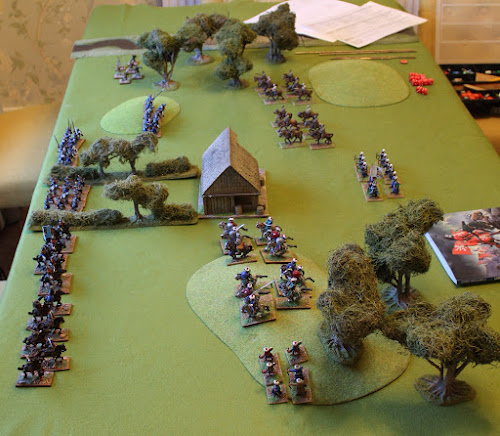The holiday break is an opportunity to catch up on some outstanding projects, one of which is trying out the Lion Rampant rules. These are pretty popular at my club, even eclipsing SAGA at present.
Lion Rampant is published by Osprey and written by Daniel Mersey. They are a simple set of rules for the medieval period based around a retinue of typically around 50 models in six or so units of 6 or 12 figures, although you can do smaller and bigger actions. It's not quite skirmish, but it is part of trend towards smaller games that don't require a year's painting before you get a game on the table. A 6' by 4' table is standard.
Each retinue has a leader, who is important, but not a super hero. Try not to get him killed though, as the courage tests can be painful. The activation sequence starts with Leaders issuing challenges, rallying battered units and testing for wild charges by your Knights. However, the key is ordered activations that require different dice throws to move, shoot or attack. This is very clever as it reflects a units willingness do undertake different actions. For example, knights are difficult to get moving but easy to charge. If you fail an activation, your turn ends, a bit like Black Powder. This means you need to decide which activations are most important to your battle plan and have lower dice requirements, so the risk of failing is lower.
The shooting and combat mechanisms are very straightforward, based on the ability of the unit and the armour class to survive hits. You remove models and that weakens the unit's impact once you reach half strength. Losing figures is even more important in the courage (morale) tests that you have to take after losing casualties, because they get deducted from the dice roll.
The game is usually played to a number of scenarios, but you can make your own up. These are typically small action scenarios around raiding, convoys and collecting taxes.
There are a few sample army lists, but you are encouraged to write your own, with some limitations to stop super army design. There are eleven troop types, all typical Western European medieval types, but you can rename them for other parts of the world. These are adequate, but might need a bit of tweaking for units like Janissaries, who don't fit well.
So, onto the tabletop. My retinues, you will be surprised, are from the Balkans! Bosnians and Ottomans for this play test. The Ottomans are the attackers and made it across the table quickly (horses move 10/12" and foot 6/8"), while the Bosnians kept failing activations and largely hugged the baseline.
This helped the Ottomans who are strong in shooters and they peppered the Bosnians causing courage tests and consequential retreats.
The Bosnian Knights eventually got a wild charge in but were clevely lured onto rough ground that made them less effective. When they routed it was game over and mass conversions followed!
These are definitely my type of rules. Simple, easy to remember game mechanics, yet plenty of subtle game play. Recommended.



Thanks just tried it today, also very good.
ReplyDelete